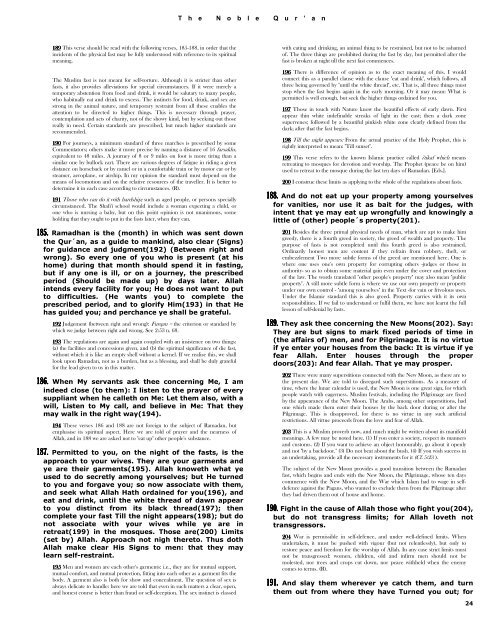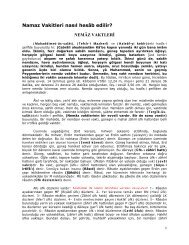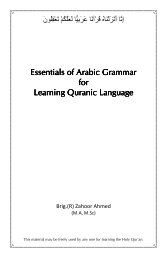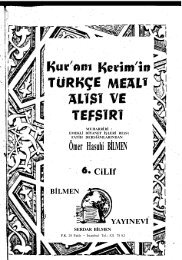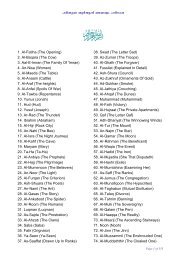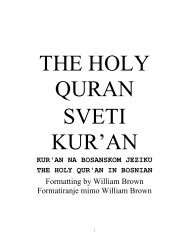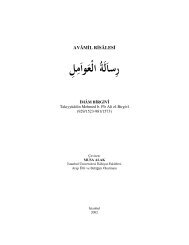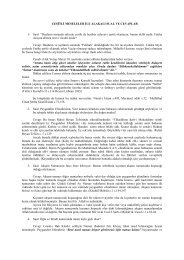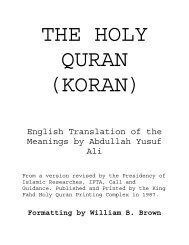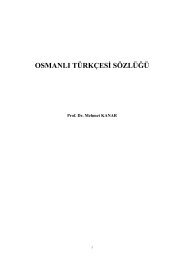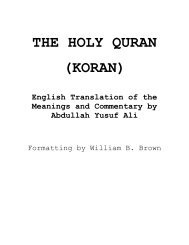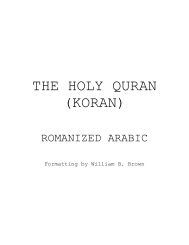English Quran with Commentaries By Yusuf-ali - HolyBooks.com
English Quran with Commentaries By Yusuf-ali - HolyBooks.com
English Quran with Commentaries By Yusuf-ali - HolyBooks.com
- No tags were found...
Create successful ePaper yourself
Turn your PDF publications into a flip-book with our unique Google optimized e-Paper software.
T h e N o b l e Q u r ’ a n<br />
189 This verse should be read <strong>with</strong> the following verses, 185-188, in order that the<br />
incidents of the physical fast may be fully understood <strong>with</strong> reference to its spiritual<br />
meaning.<br />
The Muslim fast is not meant for self-torture. Although it is stricter than other<br />
fasts, it also provides alleviations for special circumstances. If it were merely a<br />
temporary abstention from food and drink, it would be salutary to many people,<br />
who habitually eat and drink to excess. The instincts for food, drink, and sex are<br />
strong in the animal nature, and temporary restraint from all these enables the<br />
attention to be directed to higher things. This is necessary through prayer,<br />
contemplation and acts of charity, not of the showy kind, but by seeking out those<br />
really in need. Certain standards are prescribed, but much higher standards are<br />
re<strong>com</strong>mended.<br />
190 For journeys, a minimum standard of three marches is prescribed by some<br />
Commentators; others make it more precise by naming a distance of 16 farsakhs,<br />
equivalent to 48 miles. A journey of 8 or 9 miles on foot is more tiring than a<br />
similar one by bullock cart. There are various degrees of fatigue in riding a given<br />
distance on horseback or by camel or in a <strong>com</strong>fortable train or by motor car or by<br />
steamer, aeroplane, or airship. In my opinion the standard must depend on the<br />
means of lo<strong>com</strong>otion and on the relative resources of the traveller. It is better to<br />
determine it in each case according to circumstances. (R).<br />
191 Those who can do it <strong>with</strong> hardship; such as aged people, or persons specially<br />
circumstanced. The Shafi'i school would include a woman expecting a child, or<br />
one who is nursing a baby, but on this point opinion is not unanimous, some<br />
holding that they ought to put in the fasts later, when they can.<br />
185. Ramadhan is the (month) in which was sent down<br />
the Qur´an, as a guide to mankind, also clear (Signs)<br />
for guidance and judgment(192) (Between right and<br />
wrong). So every one of you who is present (at his<br />
home) during that month should spend it in fasting,<br />
but if any one is ill, or on a journey, the prescribed<br />
period (Should be made up) by days later. Allah<br />
intends every facility for you; He does not want to put<br />
to difficulties. (He wants you) to <strong>com</strong>plete the<br />
prescribed period, and to glorify Him(193) in that He<br />
has guided you; and perchance ye shall be grateful.<br />
192 Judgement (between right and wrong): Furqan = the criterion or standard by<br />
which we judge between right and wrong. See 2:53 n. 68.<br />
193 The regulations are again and again coupled <strong>with</strong> an insistence on two things:<br />
(a) the facilities and concessions given, and (b) the spiritual significance of die fast,<br />
<strong>with</strong>out which it is like an empty shell <strong>with</strong>out a kernel. If we re<strong>ali</strong>se this, we shall<br />
look upon Ramadan, not as a burden, but as a blessing, and shall be duly grateful<br />
for the lead given to us in this matter.<br />
186. When My servants ask thee concerning Me, I am<br />
indeed close (to them): I listen to the prayer of every<br />
suppliant when he calleth on Me: Let them also, <strong>with</strong> a<br />
will, Listen to My call, and believe in Me: That they<br />
may walk in the right way(194).<br />
194 These verses 186 and 188 are not foreign to the subject of Ramadan, but<br />
emphasise its spiritual aspect. Here we are told of prayer and the nearness of<br />
Allah, and in 188 we are asked not to "eat up" other people's substance.<br />
187. Permitted to you, on the night of the fasts, is the<br />
approach to your wives. They are your garments and<br />
ye are their garments(195). Allah knoweth what ye<br />
used to do secretly among yourselves; but He turned<br />
to you and forgave you; so now associate <strong>with</strong> them,<br />
and seek what Allah Hath ordained for you(196), and<br />
eat and drink, until the white thread of dawn appear<br />
to you distinct from its black thread(197); then<br />
<strong>com</strong>plete your fast Till the night appears(198); but do<br />
not associate <strong>with</strong> your wives while ye are in<br />
retreat(199) in the mosques. Those are(200) Limits<br />
(set by) Allah. Approach not nigh thereto. Thus doth<br />
Allah make clear His Signs to men: that they may<br />
learn self-restraint.<br />
195 Men and women are each other's garments: i.e., they are for mutual support,<br />
mutual <strong>com</strong>fort, and mutual protection, fitting into each other as a garment fits the<br />
body. A garment also is both for show and concealment. The question of sex is<br />
always delicate to handle: here we are told that even in such matters a clear, open,<br />
and honest course is better than fraud or self-deception. The sex instinct is classed<br />
<strong>with</strong> eating and drinking, an animal thing to be restrained, but not to be ashamed<br />
of. The three things are prohibited during the fast by day, but permitted after the<br />
fast is broken at night till the next fast <strong>com</strong>mences.<br />
196 There is difference of opinion as to the exact meaning of this. I would<br />
connect this as a parallel clause <strong>with</strong> the clause "eat and drink", which follows, all<br />
three being governed by "until the white thread", etc. That is, all three things must<br />
stop when the fast begins again in the early morning. Or it may mean: What is<br />
permitted is well enough, but seek the higher things ordained for you.<br />
197 Those in touch <strong>with</strong> Nature know the beautiful effects of early dawn. First<br />
appear thin white indefinable streaks of light in the east; then a dark zone<br />
supervenes; followed by a beautiful pinkish white zone clearly defined from the<br />
dark; after that the fast begins.<br />
198 Till the night appears: From the actual practice of the Holy Prophet, this is<br />
rightly interpreted to mean: "Till sunset".<br />
199 This verse refers to the known Islamic practice called i'tikaf which means<br />
retreating to mosques for devotion and worship. The Prophet (peace be on him)<br />
used to retreat to the mosque during the last ten days of Ramadan. [Eds.].<br />
200 I construe these limits as applying to the whole of the regulations about fasts.<br />
188. And do not eat up your property among yourselves<br />
for vanities, nor use it as bait for the judges, <strong>with</strong><br />
intent that ye may eat up wrongfully and knowingly a<br />
little of (other) people´s property(201).<br />
201 Besides the three primal physical needs of man, which are apt to make him<br />
greedy, there is a fourth greed in society, the greed of wealth and property. The<br />
purpose of fasts is not <strong>com</strong>pleted until this fourth greed is also restrained.<br />
Ordinarily honest men are content if they refrain from robbery, theft, or<br />
embezzlement Two more subtle forms of the greed are mentioned here. One is<br />
where one uses one's own property for corrupting others -judges or those in<br />
authority- so as to obtain some material gain even under the cover and protection<br />
of the law. The words translated "other people's property" may also mean "public<br />
property". A still more subtle form is where we use our own property or property<br />
under our own control - "among yourselves" in the Text -for vain or frivolous uses.<br />
Under the Islamic standard this is also greed. Property carries <strong>with</strong> it its own<br />
responsibilities. If we fail to understand or fulfil them, we have not learnt the full<br />
lesson of self-denial by fasts.<br />
189. They ask thee concerning the New Moons(202). Say:<br />
They are but signs to mark fixed periods of time in<br />
(the affairs of) men, and for Pilgrimage. It is no virtue<br />
if ye enter your houses from the back: It is virtue if ye<br />
fear Allah. Enter houses through the proper<br />
doors(203): And fear Allah. That ye may prosper.<br />
202 There were many superstitions connected <strong>with</strong> the New Moon, as there are to<br />
the present day. We are told to disregard such superstitions. As a measure of<br />
time, where the lunar calendar is used, the New Moon is one great sign, for which<br />
people watch <strong>with</strong> eagerness. Muslim festivals, including the Pilgrimage are fixed<br />
by the appearance of the New Moon. The Arabs, among other superstitions, had<br />
one which made them enter their houses by the back door during or after the<br />
Pilgrimage. This is disapproved, for there is no virtue in any such artificial<br />
restrictions. All virtue proceeds from the love and fear of Allah.<br />
203 This is a Muslim proverb now, and much might be written about its manifold<br />
meanings. A few may be noted here. (1) If you enter a society, respect its manners<br />
and customs. (2) If you want to achieve an object honourably, go about it openly<br />
and not "by a backdoor." (3) Do not beat about the bush. (4) If you wish success in<br />
an undertaking, provide all the necessary instruments for it (Cf. 5:23 ).<br />
The subject of the New Moon provides a good transition between the Ramadan<br />
fast, which begins and ends <strong>with</strong> the New Moon, the Pilgrimage, whose ten days<br />
<strong>com</strong>mence <strong>with</strong> the New Moon, and the War which Islam had to wage in selfdefence<br />
against the Pagans, who wanted to exclude them from the Pilgrimage after<br />
they had driven them out of house and home.<br />
190. Fight in the cause of Allah those who fight you(204),<br />
but do not transgress limits; for Allah loveth not<br />
transgressors.<br />
204 War is permissible in self-defence, and under well-defined limits. When<br />
undertaken, it must be pushed <strong>with</strong> vigour (but not relentlessly), but only to<br />
restore peace and freedom for the worship of Allah. In any case strict limits must<br />
not be transgressed: women, children, old and infirm men should not be<br />
molested, nor trees and crops cut down, nor peace <strong>with</strong>held when the enemy<br />
<strong>com</strong>es to terms. (R).<br />
191. And slay them wherever ye catch them, and turn<br />
them out from where they have Turned you out; for<br />
24


